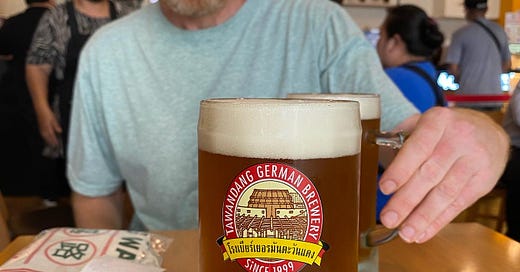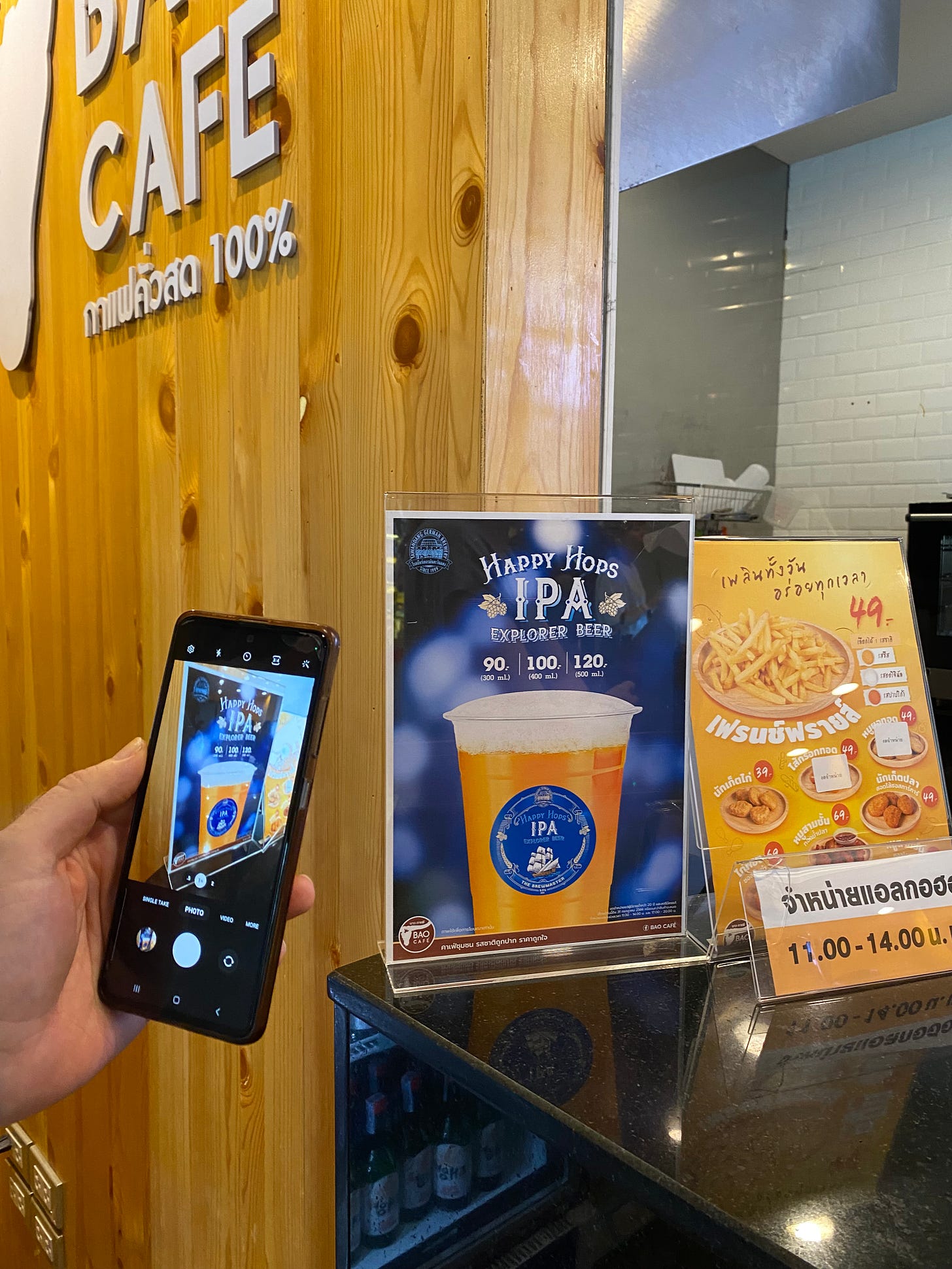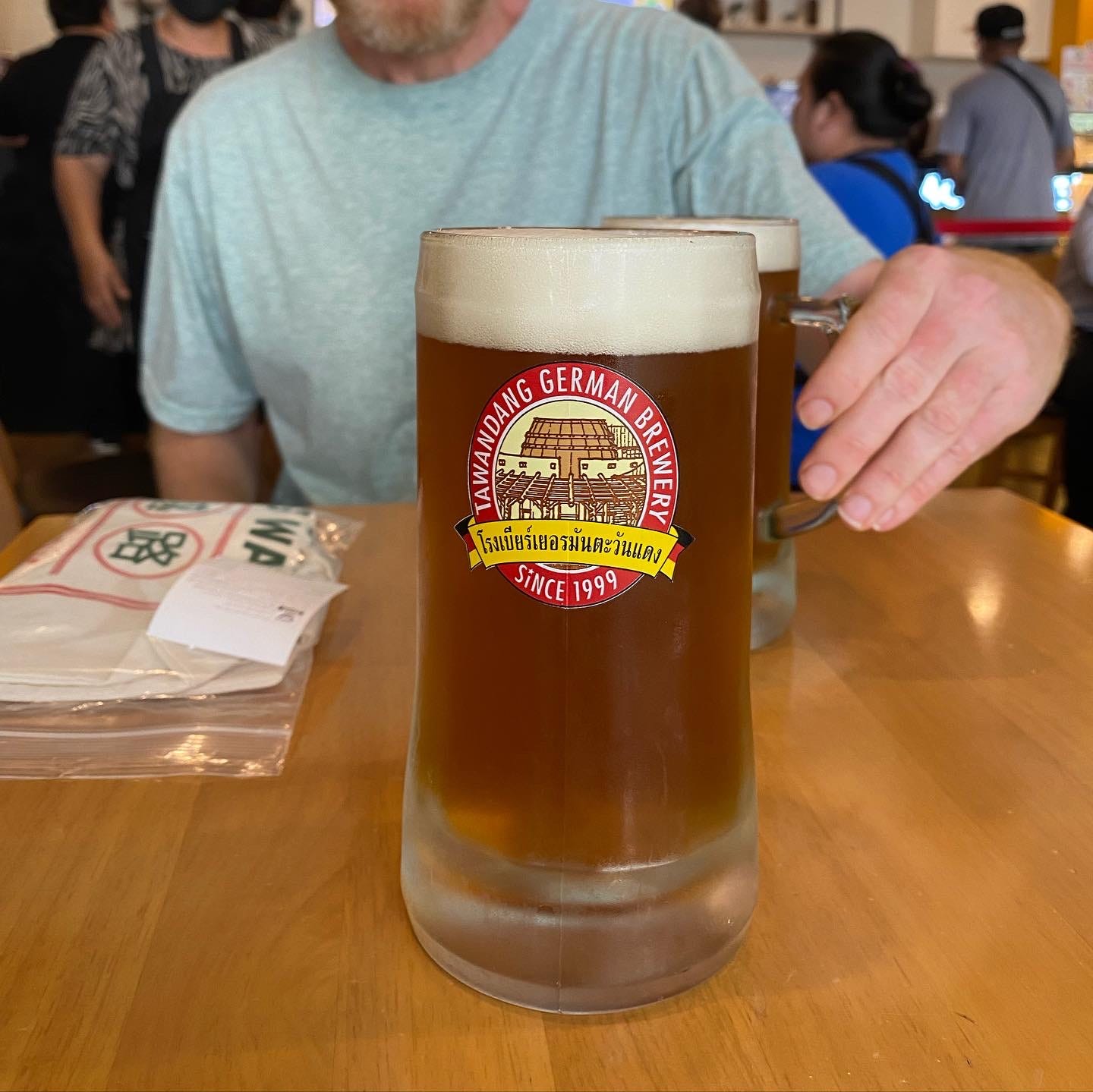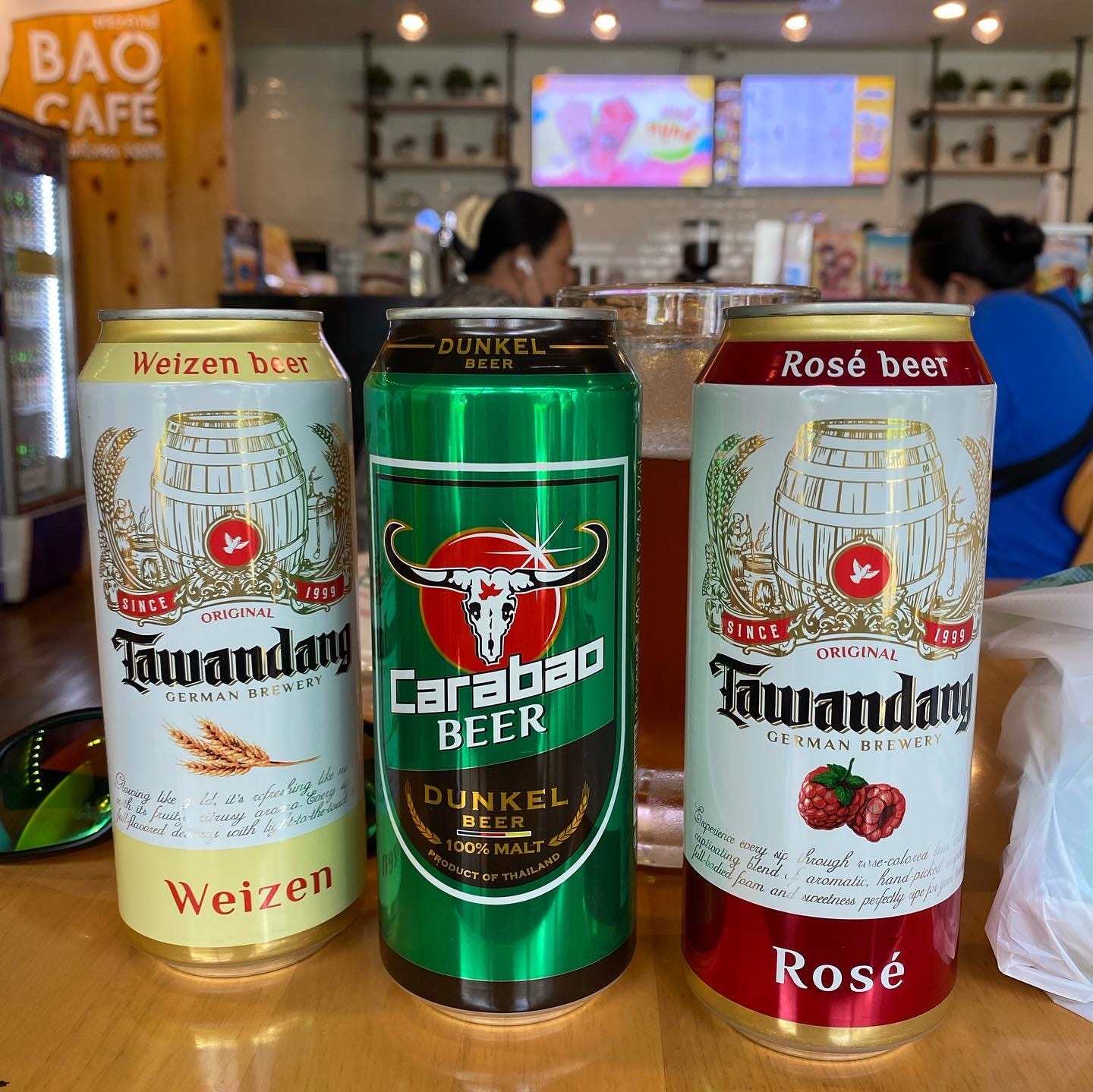Yesterday, a friend and I followed a rumor into a nondescript tower in Silom, Bangkok’s central business district, where we were led to believe a café was serving beer. Not just any beer: Tawandang beer.
The rumors were true. Inside Bao Café, a brightly lit venue that serves milky iced coffee and has all the charm of a highway pit stop in the hideous sprawl fanning out from Bangkok, we found Tawandang’s lager and IPA on draft. Even better, both cost just THB 120 (US$3.50) for a 500ml pour.
On a whim, we decided to see if the CJ More convenience store next door was selling any of these beers, too. Inside, we found flats of 490ml cans of Tawandang’s weizen and rosé (a raspberry-flavored wheat beer), as well as a dunkel in a garish, forest green 490ml can with the Carabao logo slapped on it.
None of them cost more than THB 60 (US$1.75).
The price and the beer might seem unremarkable for anyone reading this outside of Thailand. Anyone who understands its duopolistic beer market, however, is likely slack-jawed in astonishment.
For the first time in decades, there’s a new player in the beer market. And it isn’t a plucky startup—it’s a powerhouse that’s almost certainly going to shake things up.
Who owns this thing anyway?
I’ve written about Tawandang before. It’s a local chain of German-inspired beer halls that puts on ridiculous stage performances and serves its own lager, weizen, and dunkel, among other eccentricities that make these Brauhäuser special.1
Opened in 1999, Tawandang was one of Bangkok’s first legal microbreweries. Meaning, it could brew and sell its own beer—all of which are objectively good—but it couldn’t bottle or can and sell it anywhere outside the premises.
I had long wondered why Tawandang beers weren’t sold nationwide like Chang or Singha. Its three beers have always been definitively better than Thailand’s two ubiquitous brands. I assumed cost was a factor. Building a large-scale brewing facility isn’t cheap. It requires the ability to brew consistently at scale and put products into the market without quality control issues. Plus the startup costs: yikes.
Lost in my guesswork was whoever owned the business. Until now, of course.
As I learned recently, Tawandang is part of the Carabao Group, a venture co-owned by Yuenyong Opakul. A.k.a., Aed Carabao, the lead singer of Carabao, Thailand’s most successful songs-for-life band.2
Aed Carabao comes from Suphan Buri, a central Thai province known for country music and… water chestnuts, I guess? He rose to fame in the early 1980s with his first folk rock albums and never left the spotlight. In 2002, he launched Carabao Dang, a line of energy drinks that jolt your heart like a defibrillator.
Arguably more than his music, those energy drinks catapulted Aed into the rarefied air of Thai wealth.
Today, the Carabao brand is known more broadly for sponsoring the Carabao Cup, the football competition that pits 92 teams in the English Football League against one another each year.3
If you’re big enough to be the title sponsor of the EFL Cup, you’re not exactly one of the little guys. But Carabao also has a working class, country appeal. Carabao Dang is dirt-cheap, which makes it the preferred choice of the everyman, and the rapidly growing conglomerate’s CJ More minimarts tend to be a little lower on the culture scale than 7-Eleven—like Dollar General compared to Wal-Mart.
All of which is to say: it’s set up for major disruption.
Won’t somebody please think of the other big beer brands?
As I was sipping on the IPA—a 5.5% brew with a hefty malt backbone, making it closer to an English ale than a West Coast IPA—a few thoughts entered my mind.
The first was that Carabao-owned Bao Café was truly the weirdest destination I’ve gone to in Bangkok for beer. The exterior walls are painted bright yellow, like a giant bumblebee sitting at the base of the Carabao tower. And the mini-mart next door is just that: a mini-mart selling Carabao products. But yesterday, seemingly the first day the beers were sold, office workers were queuing up to buy whole flats. Remarkable.
Anyway, the second was that Tawandang entering the market will hurt Chang and Singha, for so long Thailand’s only major beer choices.4
Those two core beers are famously not good.5 But more to the point, neither of the two legacy brands that make them have a history of innovation.
Singha owns Est. 33, a quasi-craft side venture that makes another rice-based beer called Copper and Snowy, a decent if watery wheat beer that gets increasingly unpalatable the warmer it gets. Apart from these, it hasn’t released anything of note except other lagers with different branding. Like U Beer or My Beer, both of which come in slightly lower in ABV than Singha but offer little different in the way of flavor.
Chang, on the other hand, has never released anything that isn’t a vague gesture toward the abstract idea of innovation. Everything it releases is just Chang by another name. See: Chang Cold Brew, a cold-fermented Chang, which is already cold-fermented because it’s a lager; and Chang Espresso, a beer that can be adequately described as “Chang with some coffee flavor in it.”
Even the marginal brews you used to find at pop-up beer gardens during winter6 were just Chang infused with flavors like lemongrass.
Tawandang’s core beers don’t really move the needle here. A weizen and a rosé? Singha has both in Snowy. ThaiBev also has Huntsman, a Belgian blonde, and Black Dragon, its curiously named 4% amber ale. Even Hoegaarden is produced in Vietnam and China now, so it costs about the same as Snowy and Huntsman.
But a better-tasting lager, dunkel, and weizen at the same price? That’s a threat. Any half-decent competitor produced at scale should eat into the big brands’ margins.
The IPA is even spicier. A successful IPA sold at a palatable price puts pressure on both to create something new. Competition breeds innovation, or so said my economics professors back in the day. If nothing else, it could encourage the big boys to pull an AB/InBev and invest in a craft brewer that can make a better IPA for them, which would benefit Thailand’s robust and growing craft beer scene.7
Another thought struck me, though: this is also something of a shot across the bow at a certain segment of the craft beer market.
The IPA won’t compete against Baan Bangkok’s hazy beers or even Mahanakhon’s White IPA. But it might threaten the locally made pale ales and IPAs sold in the THB 150-200 (US$4.50-6) range.
What does this mean for Thai craft beer? Probably nothing. It’s another big player doing big player things. It seems unlikely that a brewery known for German-style beers even dreams of making Thailand’s answer to Bell’s Two Hearted IPA.
But it might encourage craft brewers to focus on doing precisely that instead of making pale ales that cost twice as much as Tawandang’s IPA, let alone bothering to make a wheat beer or dunkel unless it’s outrageously cheap or world-class. Clarity of purpose can be a beautiful thing for small businesses.
Whatever your take on this development, one thing is clear. Tawandang—er, Carabao?—entering the market is the shake-up Thailand has needed for decades. Even if it’s just another company worth billions doing the shaking, consumers still win.
I mean, where to begin? The child acrobats, the showtunes, the beer-guzzling challenges, the massages men receive when they step up to the urinal in the restroom? The list goes on.
เพลงเพื่อชีวิต, or phleng pheua cheewit, folk songs that highlight the hardships faced by the working class.
A quick Google search reveals that the Carabao Group has a market cap of THB 76.5 billion, or about US$2 billion.
Leo, of course, is owned by Boon Rawd, a.k.a. Singha.
Singha is drinkable, and at least a few weirdos I know somehow enjoy Chang.
RIP beer gardens, but goodbye and good riddance, Lemongrass Chang.
Boon Rawd, the owners of Singha, I’m told, allows Phuket’s Full Moon to use its brewing facilities, yet to the best of my knowledge it hasn’t put any money into the brand. That’s a shame, because doing that could benefit everyone.








This has changed my life.. 90thb draft IPA? Is this a dream? I was about to move back to the states, but cancelled my ticket once I heard about this.
Thank you